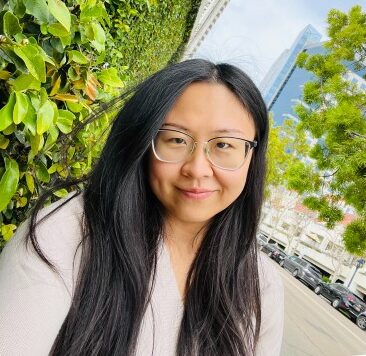
Dr. Veronica Mengqi Zhang
Dr. Veronica Mengqi Zhang joined Michigan State University (MSU) as the Organic Chemistry Laboratory Coordinator and has been working on implementing and refining the reformed laboratory curriculum towards cooperative learning and green chemistry. As a Green Chemistry Commitment (GCC) signer, MSU has prioritized green chemistry education and knowledge sharing for several years.
In this Q&A, Dr. Zhang shares her story about being part of the GCC community.
How did you first learn about the Green Chemistry Commitment?
My first encounter with green chemistry and the GCC was during my Biennial Conference on Chemical Education (BCCE) trip at Notre Dame in Indiana (2018). I attended a symposium held by Beyond Benign. I have been drawn to the concept and this community ever since.
What was the process of becoming part of the GCC community like for you?
The MSU Chemistry Department signed the GCC in 2018, which was before I joined MSU.
The Chemistry Department is committed to implementing green chemistry in its courses, including lectures, seminars and labs. During my interview to become the organic lab coordinator at MSU, they welcomed me as a green chemist after describing prior green chemistry projects I had been involved in as a doctoral student. The transition to including green chemistry as the organic lab coordinator was natural, especially as the cooperative chemistry team at MSU had already laid a foundation of green chemistry in the organic labs.
What has being part of the GCC community done for you as a faculty member?
Being a part of the GCC community allows me to keep up with the most up-to-date developments and breakthroughs in green chemistry in both academia and industries and share this information with approximately 1600 students every year.
Green chemistry is a relatively new but fast-growing field. I am very lucky to be in an institution where there is a vibrant cohort of chemists and researchers in green chemistry and especially Green Synthesis. Being part of the GCC community, we were able to collaborate on multiple projects and make progress as a team.
Any specific outcomes you can share?
MSU has some great green chemistry programs for both graduate students and undergraduate students. The REU summer program focused on Cross-Disciplinary Training in Sustainable Chemistry and Chemical Processes. The Green Cooperative Organic Chemistry Laboratory and Green Chemistry Freshman Seminar aimed to provide students with in-person experience in green chemistry and even field trips to industries on related topics!
Being part of the IUSE team, we successfully implemented a reformed Green Cooperative Organic Chemistry Laboratory curriculum in the 2021 Fall semester and have been making great progress since then. In the 2022 Fall semester, we are incorporating a new Amide Synthesis project into the undergraduate instructional laboratory. The beta testing of this work was sponsored by Beyond Benign and DOW. I am very excited for this new project!
How has being part of the GCC community impacted your students and their ability to prepare for career competitiveness?
My students come from various backgrounds in STEM: Biology, Physiology, Zoology, Kinesiology, Physics, Chemistry, etc. Our curriculum features cooperative learning and green chemistry. We want students to work as a team and tackle real-life problems using crosscutting concepts and scientific practices. Being provided with a project scenario, students will need to conduct experiments like researchers, analyze experimental data, make decisions, and communicate their findings in various scientific formats, all of which will make them more competitive in future career opportunities. Taking the Green Cooperative Laboratory course will hopefully plant a seed in their minds and help guide the direction for their professional development.
How has being part of the GCC helped your institution?
Personally, I was very excited to share our curriculum reform (towards project-based lab and green chemistry) results from MSU with the Green Chemistry Community at Beyond Benign Symposiums in the past year! It’s a great opportunity for connections as well.
In the long run, being part of the GCC sends a signal to researchers and students who are interested in green chemistry that MSU values green chemistry. I was drawn to this position because of that.
Why do you think other institutions should join the GCC?
Resources. Being a part of GCC allows you to gain access to the systematic training in green chemistry, most recent development in curriculum reform towards green chemistry, and numerous connections/symposiums held every month.
Support. GCC is a great community for researchers and chemists who share common academic goals in green chemistry. Knowing that you are not alone on this path is important in the long run.
Opportunities. Interested in future collaborations? Join GCC!
What advice would you give another faculty member about advocating for green chemistry on their campus?
JUST DO IT! You are not alone. Never underestimate how many people you can impact.
What did you share at the BCCE? What was your favorite part?
The topic of my presentation at BCCE 2022 was “Integrating Green Chemistry into the Organic Laboratory using Project-Based Experiments and Case Studies.” It was about the incorporation of the new amide project into the laboratory curriculum and how that echoes with the case study on the same topic.
BCCE conferences have always been my favorite national conferences. I absolutely appreciated the conversations with and feedback from the audience and green chemistry community.
What has the DOW grant allowed you to do that you would have otherwise not been able to do? What impact has it had on you and your students?
The beta testing of the new Green Cooperative Organic Laboratory projects was sponsored by the DOW grant and Beyond Benign. There would not be a new lab project without the DOW grant!
I also want to give credit to the three brilliant MSU undergraduate students I was fortunate to work with on the beta-testing process: Brennan Baldwin, Lillian Centlivre and Morgan Maclean. It is their hard work that led to the success of the test.
